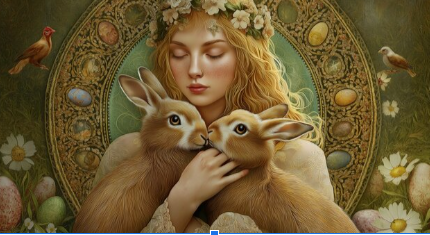
Do you ever wonder what Easter is and why it’s such a big holiday? While Easter is often associated with the Christian religion, its origins actually come from a pagan tradition.Initially, Easter was a spring celebration of fertility and rebirth to honor the Anglo-Saxon goddess Ēostre. The name “Easter” is believed to be derived from the goddess of spring and fertility, which the story says. Eostre found a bird freezing in the winter and, to save it, she transformed it into a hare, which then became a symbol of fertility and renewal, and today remains the mascot of the Easter holiday.
Adobe stock image By kodidesign
Some wonder how Easter became associated with the Christian religion. The answer to that is easily with the spread of Christianity. Through missionary work, the Roman Empire’s policies. Roman policies were initially characterized by Early persecution, driven by the Romans’ fear of Christianity’s refusal to participate in their traditional
religious practices. Later, policies shifted towards granting religious freedom, culminating in the Edict of Milan which recognized Christianity. Then Christianity became widespread, adopting various cultural celebrations in the process Catholicism and Christianity became two of the most followed religions worldwide. It is understandable why the origins of Easter and many other holidays become obscured.
After reading this article you must be left wondering “well, why does knowing stuff like this matter? ” Knowing the origins behind our favorite holidays provides us with valuable insight into our history and cultures, since many holidays are rooted in historical events or cultural practices. Like Easter, understanding the origins of holidays not only allowing us to be informed about subjects other than our own culture, but allows us to understand and build tolerance towards other beliefs and cultures other than our own, giving us a chance to better understand the value of a meaningful celebration, a cuter that might not mean as much to you for example a holiday like out national genocide Rememberance day though we as a mexican american community have not experienced in the past learning about the heart ships we are able to Empathize with the loss they have faced Recognizing their pain is an example of how we can grow to learn to appreciate each other’s holidays and traditions regardless if there is a fun celebration
The origins of cultural practice reflect the values and beliefs of a particular culture. By learning about the origins of holidays, people can learn to appreciate diverse perspectives and traditions and celebrations of other cultures outside their own. As a result, this can foster empathy. By understanding the traditions of others, we can create stronger, more respectful communities—where all cultures are valued equally.
